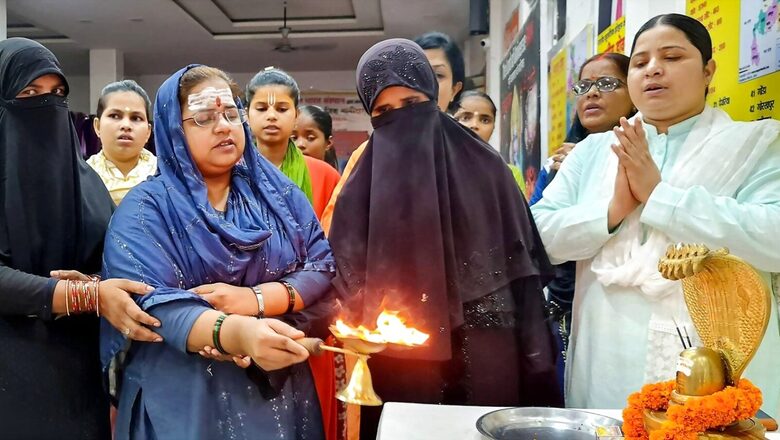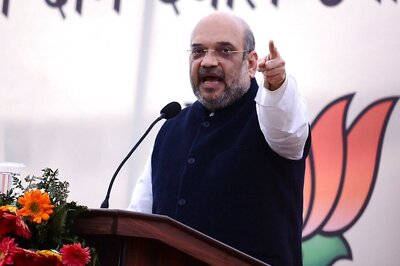
views
In a significant stepping up for the Hindu side, marking the beginning of the legal saga in the Gyanvyapi-AdiVisheshwar Temple dispute, the District Court in Varanasi on Monday ruled that the suit seeking rights to worship at the Maa Shringar Gauri Temple is maintainable.
Turning down the application filed by the Muslim Side challenging the validity of the Hindu side?s suit under Order 7 Rule 11 of the Code of Civil Procedure, Varanasi District Judge Dr Ajay Krishna Vishvesha said, ?I have come to the conclusion that the suit of the plaintiffs is not barred by the Places of Worship (Special Provisions) Act, 1991 (Act no.42 of 1991), The Waqf Act 1995 (Act no.43 of 1995) and the U.P. Shri Kashi Vishwanath Temple Act, 1983 (Act no.29 of 1983) and the application 35C filed by the defendant no.4 is liable to be dismissed.”
Dismissing the said suit, the court also directed both the sides to frame the issues and questions of the law that have to be dealt with in the main suit.
The court has now fixed September 22 as the next date of hearing.
WHAT NEXT?
After both the parties file their written submissions, the detailed arguments considering not only the oral arguments, but also the legal precedents will be put forth by both the sides.
#GyanvapiShringarGauri | Plea Upheld, Can Hindu Paksh Prove Case?Watch #TheRightStand with @AnchorAnandN#GyanvapiCase #GyanvapiVerdict pic.twitter.com/ejnXwtcn0l
? News18 (@CNNnews18) September 12, 2022
As the suit has now been made maintainable, the report of the Advocate Commissioner would also hold legal value and could also be considered by the Varanasi Court.
LEGAL OPTIONS FOR THE MUSLIM SIDE
Aggrieved by the orders of the Varanasi Court, the Muslim side has two broad legal options ? approach the High Court of Allahabad or the Supreme Court of India.
#GyanvapiCase | #Hindu side's lawyer Vishnu Jain in an exclusive conversation with CNN-News18Advocate Harishankar Jain from the hindu side shares his views on #PlacesOfWorshipAct@anany_b with details | @GrihaAtul pic.twitter.com/LCUqVyzfZU
? News18 (@CNNnews18) September 12, 2022
However, the relevant and most appropriate option remains to be to approach the Allahabad High Court. In fact, the lawyers for the Muslim side have indicated to CNN-News18 that they would first analyse the order and then approach the High Court.
The Supreme Court, too, is slated to hear the matter in October.
THE TIMELINE
The contest over the mosque can be traced back to 1194. On May 14, 1937, historian from Banaras Professor Paramatma Sharan gave a statement on behalf of the British Government in which he presented excerpts of ‘Ma Asire Alam Giri’, written by the historian of Aurangzeb’s time, which said Gyanvapit Mosque was a temple in the 16th century.
The issue subsided eventually but raised its head again in 1991 when a slew of petitions arrived before the Varanasi court with local priests seeking permission to worship in the Gyanvapi Masjid area.
One of these petitioners was Vijay Shankar Rastogi, a lawyer from Varanasi, who filed a plea in the lower court as the “next friend? of the Kashi Vishwanath Mandir’s presiding deity. Rastogi argued in his petition that Maharaja Vikramaditya built the temple where the current mosque stands roughly 2,050 years ago. He urged that the Gyanvapi mosque be demolished and that Hindus be granted ownership of the entire plot of land, as well as the right to worship inside the mosque.
#GyanvapiCase is religious justice for 'sanatani' #Hindus: Madan Mohan Yadav, advocate on Hindu sideOur temples were demolished under threat of swords and mass-death: Petitioner Sita Sahu#PlainSpeak with @ShivaniGupta_5 | #KashiVishwanath #Kashi #GyanvapiMaaShringarGauri pic.twitter.com/RqK1ILO6m3
? News18 (@CNNnews18) September 12, 2022
Furthermore, the petitioner argued that because the Gyanvapi mosque was erected upon a partially ruined temple, the Places of Worship (Special Provisions) Act, 1991 did not apply.
Following the proceedings in 1997, a trial court in Varanasi ruled that the petitioners’ redress was restricted by the Places of Worship (Special Provisions) Act, 1991.
The AIM Committee filed a petition in the Allahabad High Court in 1998, claiming that the matter could not be resolved by a civil court and citing Section 4 of the Places of Worship (Special Provisions) Act, 1991. Following this, the Allahabad High Court issued a stay order on the civil court’s proceedings.
Advocate Vijay Shankar Rastogi filed a new petition on behalf of the Swayambhu Jyotirlinga Bhagwan Vishweshwar seeking an archaeological assessment of the Gyanvapi mosque in December 2019, a month after the Supreme Court’s decision on the Babri Masjid-Ram Janmabhoomi controversy. He noted that in 1998, it was ordered to gather evidence from the entire Gyanvapi complex in order to determine the site’s religious character, but the Allahabad High Court deferred the lower court’s decision.
On April 18, 2021, Rakhi Singh, Laxmi Devi, Sita Sahu, Manju Vyas, and Rekha Pathak of Delhi filed a lawsuit, seeking permission to worship and perform rituals at Shringar Gauri, Lord Ganesh, Lord Hanuman, and Nandi on a daily basis, as well as preventing opponents from damaging the statues.
Read all the Latest News India and Breaking News here



















Comments
0 comment